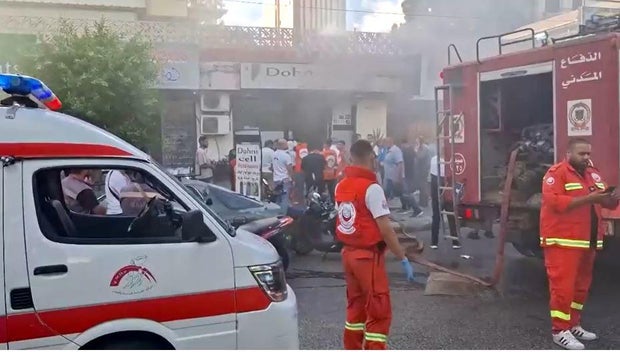More Deadly Explosions Reported In Lebanon Day After Hezbollah Pagers Explode
A source close to Lebanon's Hezbollah group told the French news agency AFP that walkie-talkies used by group members exploded in its Beirut stronghold Wednesday, with state media reporting similar blasts of pagers and "devices" in east and south Lebanon. Lebanon's Health Ministry says 20 people were killed and 450 wounded in the explosions.Wednesday, September 18th 2024, 9:56 pm
BEIRUT -
A source close to Lebanon's Hezbollah group told the French news agency AFP that walkie-talkies used by group members exploded in its Beirut stronghold Wednesday, with state media reporting similar blasts of pagers and "devices" in east and south Lebanon. Lebanon's Health Ministry says 20 people were killed and 450 wounded in the explosions.
The explosions came a day after thousands of pagers carried by Hezbollah members exploded nearly simultaneously, killing at least 12 people, including two children, according to Lebanon's public health minister. The apparently complex attacks come after weeks of rising tension between Israel and Iran-backed Hezbollah, which have exchanged fire across Israel's northern border since the Oct. 7 attack by Hamas that sparked the ongoing war in Gaza.
At least one explosion struck Wednesday near a funeral being held by Hezbollah for some of the people killed the previous day by the pager blasts. A Reuters reporter in Beirut's southern suburbs, a stronghold of Hezbollah, said he saw people from families with Hezbollah members quickly removing batteries from walkie-talkies that hadn't exploded and discarding the devices.

Lebanon's state-run National News Agency also said pagers and devices had also exploded in Hezbollah strongholds in the east and south, with AFP correspondents also reporting explosions.
Israeli defense chief says war in "a new phase"
Israeli officials have issued no public comments on the blasts in Lebanon, but a U.S. official told the AP on Tuesday that Israeli authorities had briefed American officials on the operation after Tuesday's pager explosions. Lebanese officials and Hezbollah quickly blamed Israel for the widespread attack on Tuesday, and Iranian-backed Hezbollah has vowed to take revenge.
CBS News has learned U.S. officials received about a 20-minute heads-up on the Israeli operations in Lebanon against Hezbollah militants, but was not given specific details on the methods to be used by the Mossad in carrying out the attacks.
A U.S. military spokesman and Secretary of State Antony Blinken have said the U.S. had no prior knowledge of any plans to detonate communications devices in Lebanon and had no role in the operation.
"The United States did not know about nor was it involved in these incidents, and we're still gathering the information and gathering the facts," Blinken said.
The U.S. assesses that the Israeli actions have concluded and now the focus is on the potential of Hezbollah retaliation for the covert actions. The scale of the retaliation in the coming days remains to be seen.
Addressing soldiers Wednesday in Israel, the country's Minister of Defense Yoav Gallant didn't mention the explosions in Lebanon, but praised the work of Israel's military and security agencies, calling the results of their actions "very impressive."
He said after 11 months of war in the Gaza Strip against Hamas, "the center of gravity is shifting to the north by diverting resources and forces."
The Israel Defense Forces moved its 98th Division to Israel's north on Wednesday, according to a U.S. official and another source familiar. The division had been fighting in Gaza.
"We are at the start of a new phase in the war," Gallant said, adding that it "requires courage, determination and perseverance."
Gallant and U.S. Defense Secretary Lloyd Austin spoke twice on Tuesday, according to two defense officials.
How did the pagers explode in Lebanon?
Taiwanese company Gold Apollo said Wednesday that it had authorized the use of its trademarked branding on the pagers that exploded Tuesday, but it said the devices carried by Hezbollah members were manufactured and sold by Bac Consulting KFT — a company based in Budapest, Hungary.
Gold Apollo founder and CEO Hsu Ching-kuang told NPR Wednesday that "there was nothing in those devices that we had manufactured or exported to them [BAC]."
CBS News has asked Bac Consulting where and how its devices are manufactured and sold, but has not received any reply either over the phone or via email.
Responding to CBS News in a text message, Hungarian Prime Minister Viktor Orban's spokesperson Zoltán Kovács said the Hungarian leader's office had "no knowledge/info on the matter."
In a social media post later Wednesday, Kovács described Bac Consulting as "a trading intermediary, with no manufacturing or operational site in Hungary," adding that the company "has one manager registered at its declared address, and the referenced devices have never been in Hungary."
It remains unclear exactly how many pagers blew up on Tuesday, but a senior Lebanese security official and another source told the Reuters news agency that Israel's Mossad intelligence agency had planted a small amount of explosives inside 5,000 devices, which it said were ordered by Hezbollah just months before the blasts.
The AP and the New York Times, citing unnamed U.S. officials, also said the pagers detonated Tuesday had small amounts of explosives inside them, along with embedded switches that could be detonated remotely.
The Times said the devices carried as little as one to two ounces of explosives, embedded next to their batteries. Citing Lebanese officials, the newspaper said the affected pagers received a message at 3:30 p.m. local time that appeared to have come from Hezbollah leadership, but which activated the explosives.
More Like This
September 18th, 2024
January 31st, 2025
January 29th, 2025
Top Headlines
May 1st, 2025








